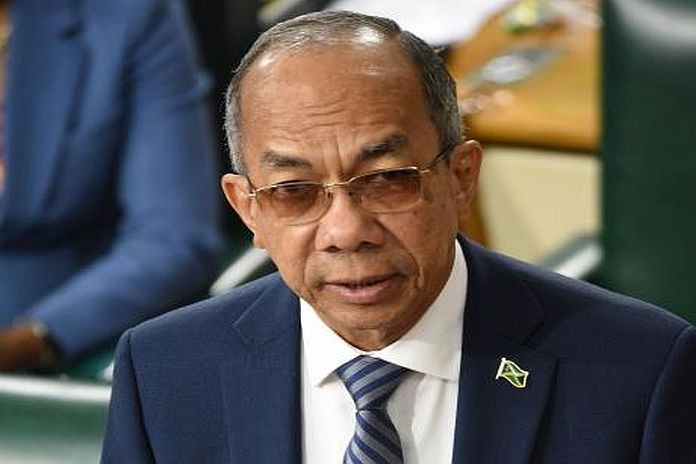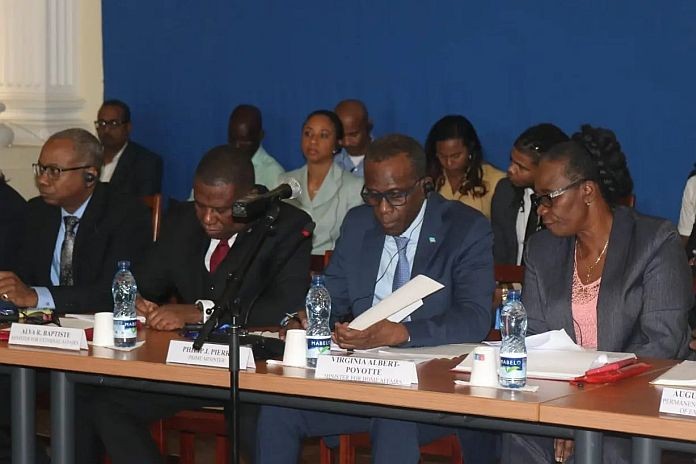By Caribbean News Global ![]()
WASHINGTON, USA – Unable to face up to resolutions to the Leahy Law restrictions amid rising crime and criminality in Saint Lucia, the government of Saint Lucia, desperate for some type of intervention has channelled to Martinique and Jamaica for apparent solutions to crime management.
December 14, 2022, prime minister and minister for national security, Philip J Pierre said, via Facebook that, he lead a delegation of government officials responsible for national security to Martinique to meet with the Préfet, Jean-Christopher Bouvier and French officials at the 8th French-Saint Lucian Joint Security Commission in Martinique.
“The commission will discuss and seek to agree on areas of cooperation in citizen security and the fight against trafficking, cooperation in disaster management, judicial cooperation, and immigration and border management.
“My administration is committed to national security and will not only continue to strengthen our institutions to protect and serve the citizens but will also collaborate with stakeholders to ensure that we preserve our freedoms and growth as a country.” #PhilipCares
A recent Caribbean News Global (CNG) article noted St Lucia’s police force is beyond repair – meanwhile, political divisiveness, guns, drugs, and gangs operate at will. However, the government and the Royal St Lucia Police Force [RSLPF] are said to be continuing cooperation with partners to improve citizen and border security.

On December 15, a news report from Jamaica noted deputy prime minister and minister of national security, Dr Horace Chang, is on an official two-day visit to Saint Lucia, where he is having high-level discussions with prime minister Pierre, as well as the minister of home affairs and public service, Dr Virginia Poyotte.
“When there are security challenges in Jamaica or in Saint Lucia, it impacts on all of us. We are one Caribbean and we have to work together to combat all security threats to the region,” Chang said. He is also scheduled to meet with the incoming chairman of the CARICOM Council for National Security and Law Enforcement (CONSLE) – responsible for the coordination of the multi-dimensional nature of security, to ensure a safe and stable Community.
As with the French connection, the Jamaican meetings are said to be “centered around bilateral and regional security matters, including strengthening cooperation, improving communication and capacity building.”
Last Monday, the prime minister and minister for national security, told reporters that no one should pretend crime could stop today.
“Nobody stopped it today. I can’t stop it today,” Pierre, added. “It’s incremental, it’s work in progress and we’re working towards it,” he explained. “I’ve asked, I have put in public – anyone who has the solution to the crime problem for today, I’ll join with them. Anyone who pretends that there’s a today solution is [basically] being dishonest and it’s not the time to play politics or to gloat,” he said.
Saint Lucians are struggling with a Merry Christmas and a dangerous Christmas, simultaneously, while Saint Lucia is still subject to Leahy Law and ever-increasing criminal pedigrees.
The writing has been on the wall for a very long time that The Leahy Law, continues to be the elephant in the room, alongside IMPACS. Diversion of efforts to national security in Martinique, Jamaica and CARICOM, are inconsequential and will continue along the lines of a zero-sum game – if the Leahy Law and IMPACS are not addressed head-on.
And it is essential to understand US action in the Caribbean utilizing behind the scene politics, economics, governance and sovereignty issues that impact the region.
- Read more: What’s the fear over the IMPACS investigation?
Integrity matters, likewise public trust and the principle of transparency. Without trust, there is little chance to fight the ravages of crime, poverty, and hopelessness; and to confiscate the proceeds of crime.
So what’s the fear over IMPACS investigation and the recommendations, when the damage has already been done?
Perhaps the biggest reason you’ve heard is that the report suggests that “the crime problem in Saint Lucia is facilitated by corrupt politicians/government officials, business persons and police officers.”
The onus is and has always been on Saint Lucia to deal with the alleged extra-judicial killings in 2010/11 by officers of the RSLPF “ through credible judicial processes and prosecutions” if the government wants the sanctions lifted.
Protecting national security is more challenging in this era. It requires long-term catalysing and contemplated support alongside security, diplomacy, trade, investment, and investing in relationships.
A shared vision of strategic leadership in the security space is also necessary to build strong links to protect against Saint Lucia’s security risks.
The consequences are clear – exploring IMPACS to bring relief to the Leahy Law on Saint Lucia amid internal and external factors, and pursuing bilateral and multilateral engagements.
The government of Saint Lucia must act within due process, as the rule of law commands, and close the door on further speculation to derive the desired results, to curb crime and criminality in Saint Lucia.
There are no shortcuts in the toolbox facing the current scenario.





